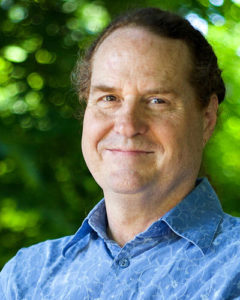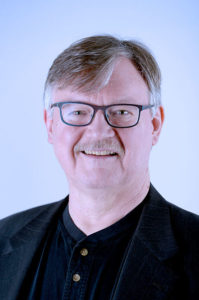After coronavirus concerns moved life and learning online in March of 2020, artist-administrators at three of Seattle’s preeminent undergraduate theatre programs—the University of Washington, Seattle University, and Cornish College of the Arts—found themselves searching for support.
“We started talking together as a way of brainstorming and sharing resources,” said Rosa Joshi (she/her), a theatre director and the chair of performing arts and arts leadership at Seattle University. “It was about, what the hell are we doing now?’”
Early conversations addressed logistics: COVID-19 safety practices, remote teaching tips, plans for eventual reopening. As shows were cancelled and classes moved online, the sense of loss was profound.
“We work in this art form that is all about people being in a room together, sharing the physical vibrations of bodies and voices together in space,” said Richard E. T. White (he/him), chair of the Cornish theatre department, “and that got taken away from us.”

Like artists do, this cohort of theatremakers countered heartbreak with innovation. Geoff Korf (all pronouns) was appointed executive director of the University of Washington School of Drama less than a year before COVID-19 hit Seattle in earnest. He’d been teaching lighting design at UW since 2002, and in his new leadership role, he prioritized fixing a longstanding imbalance between opportunities for BFA and MFA students. That meant providing his undergraduates with a stellar artistic program, pandemic or no.
Korf found inspiration—and soon, seed money—when the University of Washington’s Floyd and Delores Jones Endowed Fund for the Arts put out a call for grant proposals focused specifically on collaborative projects within UW or with external partners. Uncharted Waters, as this institutional collective is now known, was born.
Given the vagaries of geography, scheduling, and Seattle traffic, you’d be hard-pressed to get students from three schools together in one space at one time. But those complications don’t apply to online rehearsal rooms, and more connections forged among artists means a stronger arts community overall. By producing online shows together, these educators realized, their students would become part of the cross-pollination process that feeds Seattle’s tightknit professional theatre community. Why not help expand their networks at a time when their ability to meet new people is limited?

On March 11, two plays with casts and creative teams made up of students, faculty, and alumni from all three schools will celebrate online opening nights. Seattle U’s Joshi directs Shakespeare’s Twelfth Night, while Cornish faculty member Sheila Daniels and Porscha Shaw, a graduate of UW’s MFA acting program, co-direct the devised theatre piece Bodies of Water. The programming offers students two plays that are structurally very different but exist in conversation with one another: Twelfth Night folds ideas of identity and connection into a buoyant comedy, while the ensemble-created Bodies of Water swirls around broad themes of harm and healing, care and celebration of our own bodies and others’ bodies to ask, among other things, how we show up for one another during our country’s dual pandemics of coronavirus and systemic racism.
“My first impression was, they’re really gonna do this?” said Shaw (she/her), eyebrows aloft as she described her initial response this complex co-production. “And my next impression was, this should have been done a long time ago.”
For Taylor Freeman (she/her), a second-year acting student at UW and Twelfth Night cast member, the practical value of working with non-UW students was immediately apparent. “It’s helped me realize I was doing really well in certain areas, and now that I’m watching skills or techniques that [students from other schools] have, it makes me think, I’d like to up my skill level in that way,” she said. “I want to be versatile, so I’m matching what they bring to the rehearsal room.”
On an institutional level, one clear perk of combining resources is financial: both Uncharted shows boast creative teams stacked with top-notch video artists and composers, a real boon to boosting production value of online theatre. Each school is also reaching new audiences, thanks to the power of shared marketing avenues—always a good thing.

Balancing the needs of different programs with different priorities has complicated matters. An example: SU’s student actors, who pursue their theatre major (often half of a double major) as part of a robust liberal arts education, generally only perform in one show each quarter. Students at Cornish, a conservatory program, have many more performance opportunities. Finding parity between student bodies and their educational expectations is crucial. So far, most feel, the benefits outweigh the pitfalls. “As long as everyone is open-hearted, there can’t be too many creative minds in a room,” Daniels said.
“I definitely want to make all the Seattle theatre connections that I can, so this is kind of the perfect final assignment for me,” said Quinn Chase (he/him), a fourth-year Cornish student who is stage managing Twelfth Night. For Chase, this production is a bright spot in a dark time—in mid-February, Cornish unceremoniously announced that it was discontinuing two majors, including his Performance Production major. It was a blow—a rug ripped out from under a program he loves and has invested so much of himself in.
“It has been helpful to be making this art with these people,” he said. Plus, he’s already landed his next dream gig: working on a spring show with local outfit Washington Ensemble Theatre. So, he’ll stay in Seattle, at least for a while.
Building connections among students is undeniably valuable, but what about building connections among students and the creative community in which they live? During a recent online symposium called “Relational Art-Making: Cultivating a Beloved Seattle Theatre Community,” presented under the Uncharted Waters umbrella, student artists connected with local artistic directors and theatre leaders to ask big questions—about equity and access, about the work being produced in the city, about the values of the theatre community. The future of the Uncharted Waters project remains unknown, but, as Joshi explains it, the time is right to harness the collective power of educational institutions to define the future of the field.
In the face of a global, industry-gutting shutdown, finding positive paths forward, and seeing abundance rather than scarcity, doesn’t feel Pollyanna-ish—it feels psychologically necessary.
“As we started hatching this project, we became aware of the symbolism, which was that this isn’t just about making a piece of art,” White said. “This is a celebration of survival and community. By doing this in the face of this pandemic, and all of the obstacles that we face, we’re making a statement about what we believe in.”
Gemma Wilson (she/her) is an arts writer based in Seattle, and a contributing editor at American Theatre. gemmaspacilwilson.com




